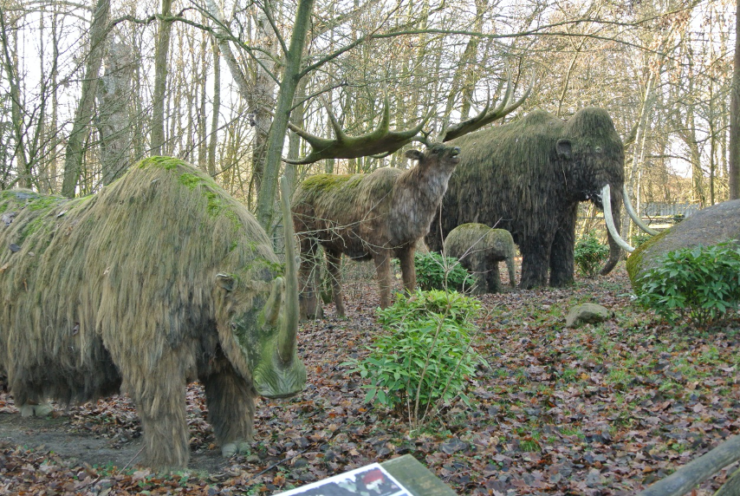Workshop 3: Extinction – Conservation – Resurrection?

Woolly rhinoceros, Irish elk and woolly mammoth at GaiaZOO. Photo © 2020 Karlijn Herforth
The rise of the modern zoo coincides with the Industrial Revolution and Western Imperialist expansion, which in turn is tied to the human transformation of the planet now culminating in the catastrophic loss of biodiversity known as the sixth global extinction event. Thus, the history of the Anthropocene is in many respects coextensive with the history of the zoo. And much like the discourse on the Anthropocene, the discourse on the zoo tends to be infused with a sense of mourning and melancholia, expressed in the form of narratives of loss, as well as quasi-apocalyptic visions of the future. Thus, John Berger frames his entire analysis of the zoo in terms of the disappearance of animals in modernity. “Everywhere animals disappear,” he writes, and those animals held captive in zoos “constitute the living monument to their own disappearance.” Zoos, by the same token, would be monuments to (and of) the Anthropocene. As Theodor W. Adorno notes in Minima Moralia, zoological gardens “are laid out on the pattern of Noah’s Ark, for since their inception the bourgeois class has been waiting for the flood.” Such imaginaries of apocalypse and redemption more often than not harbour “disanthropic” (Garrard) and/or “zooicidal inclinations” (Pick), or else indulge in hubristic and ultrahumanist fantasies of biotechnological mastery over nature—especially in the ongoing efforts to bring extinct species back from the dead. How might we move beyond these familiar narratives, and what role can literature, film, and other forms of art play in imagining alternative, multispecies futures?
Workshop Programme
Wednesday 28 October
12.15–12.30* Welcome & Introductions
12.30–14.30 SESSION 1: The Zoo of the Future / The Future of the Zoo
Christina May (Rostock) | Karlijn Herforth (Utrecht)
Materials:
- Jon Coe and Ray Mendez, “The Unzoo Alternative,” ARAZPA Conference Proceedings (2005)
- John Fraser and Dan Wharton, “The Future of Zoos: A New Model for Cultural Institutions,” Curator: The Museum Journal 50.1 (2007): 41–54.
14.30–14.45 Break
14.45–16.45 SESSION 2: Bear Life
Andrew Westoll (U of Toronto, Scarborough) | Anastassiya Andrianova (NDSU)
Materials:
- Andrew Westoll, “Giant Pandas of the Baroque,” excerpt from The Zoo and You (forthcoming)
- Yoko Tawada, Memoirs of a Polar Bear, trans. Susan Bernofsky (New York: New Directions, 2018), [Excerpts: pp. 169–171, 190–202, 220–225, 242–251]
- Frank Noelker, Polar Bears (1994)
17.00–17.15 Break
17.15–19.00 KEYNOTE 1: “(Xeno)pregnant Endings and (Zoo)beginnings in Contemporary Fiction”
Susan McHugh (University of New England)
Thursday 29 October
12.30–14.30 SESSION 3: Of Other Spaces I: Arrivals, Departures, Remains
Concepción Cortés Zulueta (Málaga) | Harriet Smith (Cardiff)
Materials:
- “The Bower Birds in the Garden of the Zoological Society, Regent’s-Park,” The Illustrated London News, vol. xv, no. 380 (14 July, 1849), p. 29.
- Joseph Wolf, “XXVIII. The Satin Bower Bird,” in Zoological Sketches Made for the Zoological Society of London, from Animals in Their Vivarium, in The Regent’s Park. Second Series, ed. Philip Lutley Sclater (London: Henry Graves, 1867).
- Harriet Smith, “Power-Station Paradise Garden: A Relational Approach to London Zoo” (2020)
14.30–14.45 Break
14.45–16.45 SESSION 4: Embodied Prosody & Zoomorphic Bodies
Mia You (Utrecht) | Sarah Bezan (Sheffield) | Jonathan Osborn (Berlin)
Materials:
- CAConrad, “Right to Manifest Manifesto” (2012)
- CAConrad, “Resurrect Extinct Vibration” (2016)
- Jonathan Osborn and Danielle Baskerville, “Ark” (2018) + “Arche” (2018)
- Jonathan Osborn, “Zoomorphic Bodies: Moving and Being Moved by Animals,” in Zoo Studies: A New Humanities, ed. Tracy McDonald and Daniel Vandersommers (Montreal and Kingston: McGill–Queen’s University Press, 2019), 294–311.
16.45–17.15 Break
17.15–19.00 KEYNOTE 2: “The Price of Proliferation: Captive Breeding and the Multispecies Politics of Female Sexual Reproduction in the Sixth Age of Extinction”
Juno Salazar Parreñas (Cornell University)
Friday 30 October
12.30–15.00 SESSION 5: Of Other Spaces II: Extracts, Lists, Absences
Tessel Janse (Goldsmiths) | Dominic O’Key (Leeds) | Sonia Levy (London)
Materials:
- Máret Ánne Sara, Pile o’Sápmi(2016)
- Kim Stanley Robinson, 2312 (New York: Orbit, 2012), excerpts: pp. 36–40, 210–11, 394–410.
- Sonia Levy and Martin Savransky, For the Love of Corals: An Ecology of Perhaps (2018–2020) <https://critical-zones.zkm.de/#!/detail:for-the-love-of-corals>
15.00–15.15 Break
15.15–16.00 Conclusion & Future Plans

